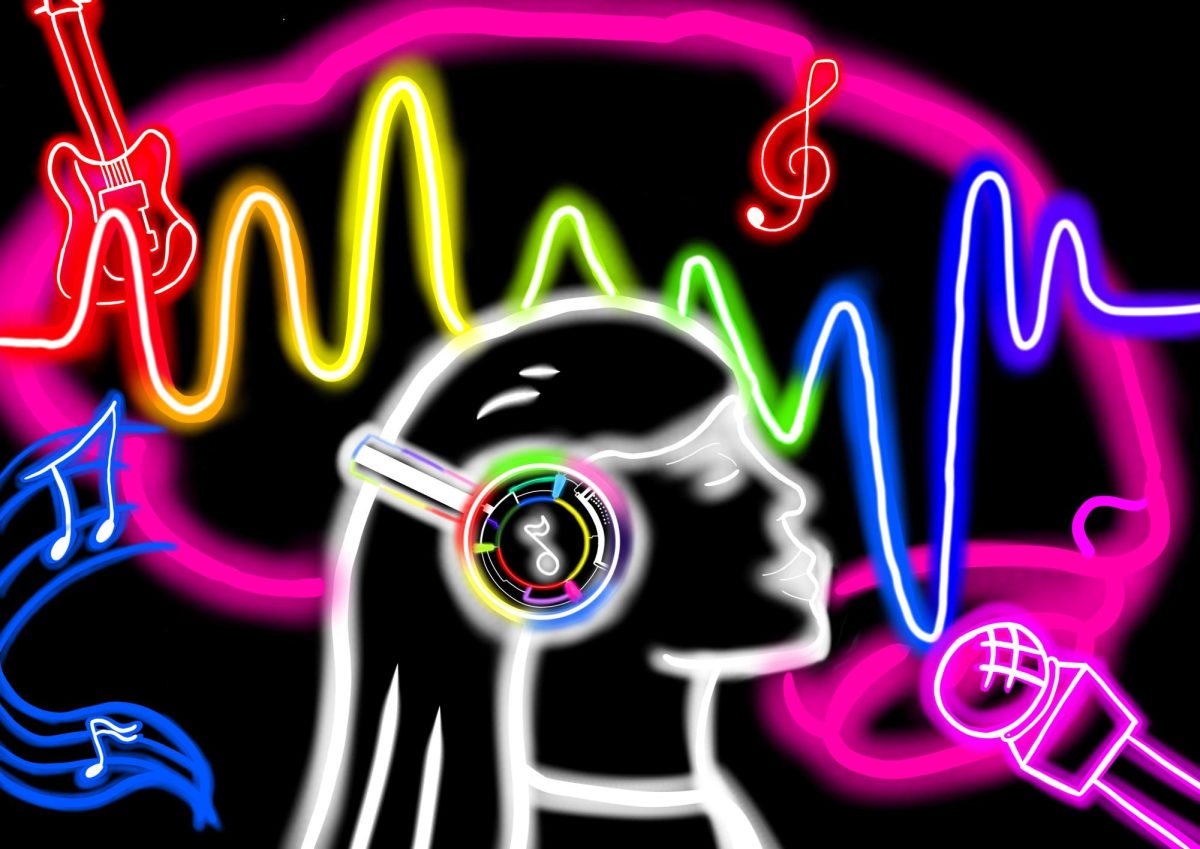Whether you are singing a lullaby to an infant or playing music during a special moment — graduations, parties, birthdays — music drives people to feel a certain way from the moment the tunes leave the speaker and enter their ears.
People are exposed to different music genres, whether when they are walking around the city, working in a busy coffee shop, sweating during a workout in a local gym, or watching a classic movie.
Let’s face it, music is all around us. It can control how we think, feel, and go about our day-to-day lives. Music plays an important role in influencing and defining how your mind and body run.
Pfizer author, Jennifer L.W. Fink, commented on the statistics and inquiries on how music affects people.
“Different types of music can help relieve stress, enhance your mood and even increase your brain function,” Fink said.
Listening to your favorite tunes can release dopamine, which makes you feel happier and more energetic. It also increases focus and concentration. Studies by numerous professors have even shown that it can help with mental and physical pain.
“When hearing certain tunes, the limbic system in one’s body is a major factor in controlling memory and processing emotions when our ears perceive music,” Fink said.
The combination of instrumental tunes, beats, and melodies is transmitted to our brains by neurotransmitters.
“The chills you feel when you hear a particularly moving piece of music may be the result of dopamine, a neurotransmitter that triggers sensations of pleasure and well-being,” Fink said. “As your brain becomes familiar with a particular song, your body may release dopamine upon hearing just the first few notes of the song.”
Fink explains that the brain processes music by analyzing the pitch, timbre, rhythm, dynamics, and beat. These factors are unique and specific to each song.
“The brain must integrate the sequentially ordered sounds into a coherent musical perception,” an article published in the “Journal of Biology” said.
Considering the science of how music influences one’s mood, it is important to consider what genres, for example, Pop, Rock and Roll, R&B, Electronic, Jazz, Hip-Hop, and Country, are most important for one to listen to when they desire a certain mood. When desiring a cheerful and uplifting mood, listening to upbeat, Jazz, Pop, or instrumental music is valuable.
When in the mood to reminisce about hard or challenging times in their life, many are confronted by slower and sad music.
While it may be enjoyable to relate to the music that holds more sad emotions, it is also crucial to remember that these songs have a profound impact on your mood and attitude on a daily basis.
In an article from the Tallahassee Memorial Healthcare Center, Megan Hoffer discusses how the music one listens to affects their mood.
“A music playlist that gradually moves from uncomfortable emotions to comfortable ones can be a healthy coping strategy and facilitate a positive mood change,” Hoffer said.
All around the world, music affects different people and plays a valuable role in determining your feelings. Music and its unique capabilities play an important role in the daily lives of teenagers worldwide.
Gaby Shanner (10), discussed her diverse music taste, including Pop, Electronic Dance Music, House, Rap, and 80’s music. Shanner often listens to music to de-stress while driving.
“When I listen to my favorite music, I feel happy and it is a good way for me to de-stress,” Shanner said. “When I am in my car, and I turn the music up, it gets me going and the energy is super high.”
Some of Shanner’s favorite songs include “That So True” by Gracie Abrams and “28” by Zach Bryan, as well as a variety of tracks by ASAP Rocky and John Summit.
Listening to music also enhances her mood, especially when driving at night with friends. On the other hand, Shanner discussed how music supports her mental well-being.
“Music is a good way to distract my brain not to be anxious or overthink,” Shanner said.
Shanner noted that different music genres can affect her mood and productivity, such as house music that helps her focus. She avoids music with lyrics while studying for exams because it breaks her concentration.
“Sometimes my brain gets distracted when I try to study with music that has lyrics, and I try to avoid listening to music when I have to focus on something important,” Shanner said.
Taking a look into her own unique opinions, Shanner emphasizes the importance of how the type of music you listen to affects your mood and judgments.
“I feel like if you listen to sad music you are going to be sad, and if you listen to calm music you are going to be calm,” Shanner said. “Overall, I feel like music really does reflect how you feel and what mood you are in.”
AP Psychology teacher, Lynn Leahy, discusses her music preferences and how they affect her individual mood.
“I listen to a lot of Taylor Swift, Hip-Hop, and popular music,” Leahy said. “I believe that the type of music you listen to can influence both productivity and mood.”
Leahy also consults the positive benefits music has for all.
“Music has a lot of therapeutic benefits,” Leahy said. “It is especially good for younger kids who have trouble expressing themselves.”
Take a look into the reasoning behind why music affects one’s emotions, Leahy examines the patterns of the brain.
“When you are sad, you are inclined to listen to sad music and when you are happy you are inclined to listen to happy music,” Leahy said. “Different types of music can help your brain jog memories and affect your mood in a variety of ways. When listening to songs, they have different melodies and beats — which touch your brain.”
Leahy mentioned why music and some of our favorite songs have such a strong effect on oneself.
“Everyone has a song they play over and over again,” Leahy said. “A song that makes them cry or makes them happy, it is really therapeutic.”
Another student, Nirvana Alavi (10), discussed her interest in the diversity of music she listens to, which ranges from R&B to reggae and pop, influencing her moods and emotions.
“I find comfort in familiar tunes, and I use them as a way to escape stressful situations, such as classroom conflicts or personal issues,” Alavi said.
Alavi finds comfort in the quiet and de-stressing availability that music and playing the drums provide her, which she finds enjoyable and comforting.
“I feel like when I am studying, my favorite songs help me to focus while studying,” Alavi said.
Ava Timlake (10), discussed her music preferences, detailing how different genres and artists influence her mood.
“When studying I focus best when listening to Minecraft music since it can get me focused and pry away from the lyrics distracted,” Timlake said. “I enjoy listening to songs by Bryson Tiller, PARTYNEXTDOOR, and Frank Ocean. I get chills when I listen to these songs and it allows me to let go and break away from any stress.”









